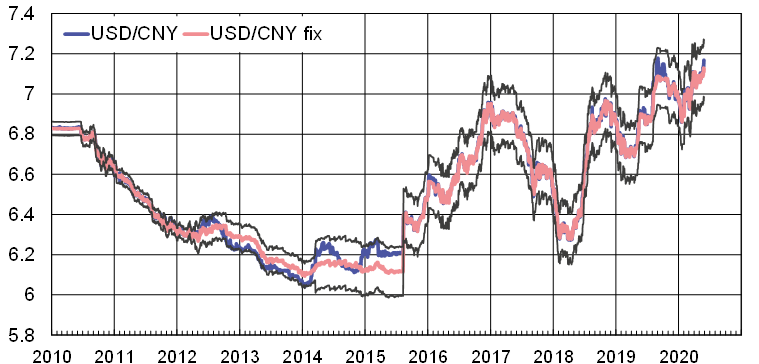BOFIT Viikkokatsaus / BOFIT Weekly Review 2020/22
Relations between the US and China have grown tense with the ongoing harm from COVID-19, uncertainty about implementation of the US-China trade agreement, China's plans to impose security laws on Hong Kong, and new restrictions on American companies working with Chinese partners. The impending US presidential election in November has added its own political dimension.
The “phase one” of a US-China trade agreement in January was initially seen as a signal of thawing relations. China committed under the agreement to increase imports heavily from the US (BOFIT Weekly 04/2020). China's total imports of US goods, however, contracted by nearly 6 % in January-April. While premier Li Keqiang offered assurances last week that China still plans to fulfil its commitments, achievement of the target seems unrealistic (BOFIT Blog 19.5.2020).
The uncertainty created by the coronavirus and the threat that the trade agreement falls apart have heightened the Trump administration's China rhetoric. Among other things, US president Donald Trump has threatened to pull out of the deal and even cut off relations entirely with China. The US has also lately the tightened restrictions on technology sales to Huawei based on national security grounds. Last week the US Department of Commerce announced plans to blacklist 33 Chinese tech companies which it considers to be involved in the crackdown on Uighurs in Xinjiang province.
The situation with Hong Kong and Taiwan creates security- and value-based tensions between China and the US. China’s efforts to impose new security laws on Hong Kong have raised widespread opposition in the US and president Trump has promised countermeasures soon. US Secretary of State Mike Pompeo’s show of support for the recently re-elected Taiwanese president Tsai Ing-wen and Taiwan's democracy, as well as the possible sale of US torpedoes to Taiwan, have irritated the Chinese regime. China considers both Hong Kong and Taiwan part of its domestic policy.
Since April, when the Chinese coffeehouse chain Luckin Coffee was caught cooking its books and threatened with expulsion from the New York Nasdaq, the accounting practices of China's exchange-listed firms have come under greater scrutiny in the US. Moreover, a US federal government pension fund was ordered not to invest in Chinese companies. The US Senate passed on a bill that obliges foreign companies listed on US stock exchange companies to open their accounts to US authorities. According to the Chinese business media company Caixin, 95 % of listed companies whose financial accounts cannot be reviewed by US authorities use Chinese or Hong Kong auditors.
China has allowed the yuan's exchange rate to depreciate gradually against the dollar throughout the spring. This week, however, saw a sudden deterioration with in yuan plunging to its lowest level in 12 years. The exchange rate has been the subject of long-running feud between the US and China.
China policy is a theme in the approaching US presidential election. Candidates Trump and Joe Biden have accused each other of having a soft spot for China, although both have strict China policies in their platforms. There is also a political logic driving the debate. Politico, an online US magazine, commissioned a survey that found 31 % of Americans consider China to be the enemy, up from 20 % in January.
The yuan has weakened against the dollar this year

Sources: People’s Bank of China, Macrobond and BOFIT.